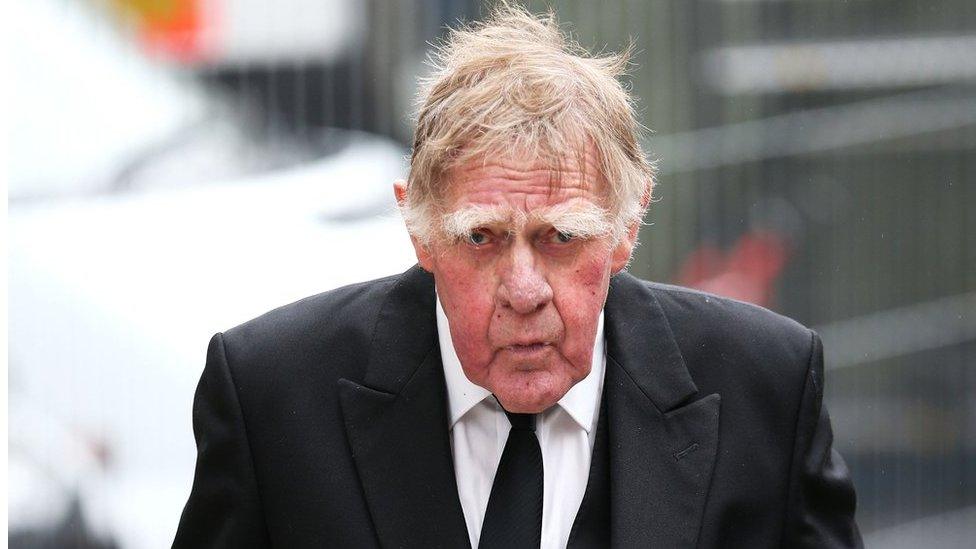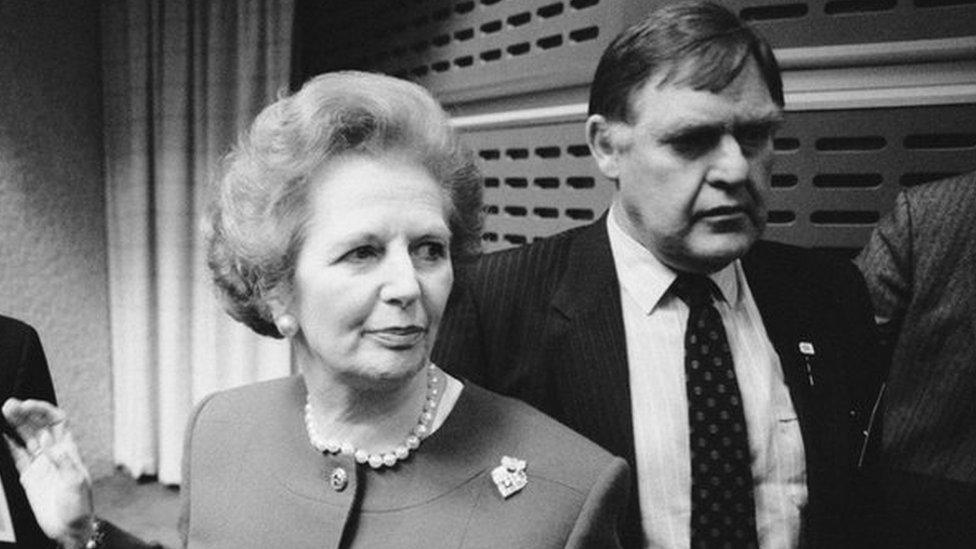Bernard Ingham: Margaret Thatcher's press chief dies aged 90
- Published

Sir Bernard attended Baroness Thatcher's funeral at St Paul's Cathedral in 2013
Sir Bernard Ingham, Margaret Thatcher's press chief in Downing Street, has died, his family have announced.
Known for his straight-talking approach, Sir Bernard served in No 10 throughout Mrs Thatcher's premiership from 1979 to 1990.
The former journalist, who was 90, died on Friday lunchtime after a short illness, surrounded by his family, a statement said.
His son John said: "My family will miss him greatly.
"To the wider world he is known as Margaret Thatcher's chief press secretary, a formidable operator in the political and Whitehall jungles.
"But to me he was my dad - and a great dad at that. He was a fellow football fan and an adoring grandfather and great-grandfather."
Born in Halifax on 21 June 1932, Sir Bernard left school at 16, and made his name as a campaigning journalist for the Hebden Bridge Times and later the Yorkshire Post.
He wrote columns for the local Labour Party newspaper, labelling the Conservative governments of Edward Heath and Alec Douglas-Home enemies of the workers.

Sir Bernard Ingham with Lady Thatcher
In 1965, he moved to London to become an industrial correspondent for The Guardian.
After being passed over for promotion, Sir Bernard joined the civil service as a government press officer, positioning himself as a bitter enemy of "spin" and criticising those who practised the "black art".
During Labour's years in power, he worked for left-wingers Barbara Castle and Tony Benn.
In May 1979, when the Conservatives swept to power, he was chosen to become chief press secretary for the new government.
Thatcher's defender
Some doubted the former Labour-supporting campaigner could work for a Tory leader. But like Lady Thatcher, Sir Bernard was an outsider.
He would handle the media for Mrs Thatcher throughout her premiership.
For a decade, he was her media champion, often clashing with journalists and sometimes her own cabinet ministers.
He was known for briefing against ministers who displeased their boss, famously labelling John Biffen a "semi-detached member of the government" after he criticised Thatcherism.
When Mrs Thatcher was ultimately deposed, few thought Sir Bernard could work for anyone else.
He retired - with a knighthood - to a modest bungalow in Purley, south London, and returned to journalism alongside writing his memoir, Kill The Messenger.
Controversial comments
Free to speak his mind after leaving government, Sir Bernard sometimes sparked outrage.
He refused to retreat from his view that the 1989 Hillsborough disaster - which claimed the lives of 97 Liverpool supporters - had been caused by "tanked-up yobs".
And in a 1996 letter replying to fan Graham Skinner - whose friend had died in the disaster - Sir Bernard said Liverpool should "shut up about Hillsborough".
He also accused Scottish nationalists of being "fuelled" by the "smell of oil and money in oil".
He was still filing regular columns to The Yorkshire Post and the Daily Express until weeks before his death.
Sir Bernard was married to Nancy Ingham, a former policewoman, for 60 years until she died in 2017.
He leaves a son, two grandchildren and a great-grandchild.